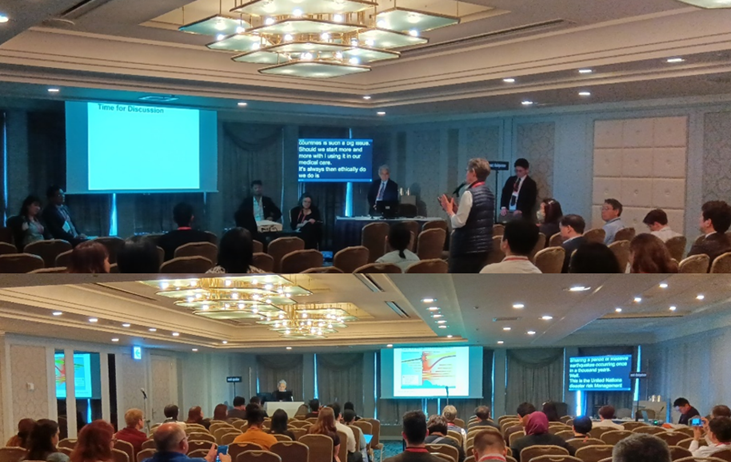WADEM 2025 パネルディスカッション:ヘルスセキュリティーのための多分野連携
第23回世界防災救急医学会(WADEM Tokyo 2025)が、東京・京王プラザホテル(2025年5月2日~6日)で開催されました。京都大学大学院医学研究科社会健康医学系専攻および京都大学医学部附属病院から、学生を含む10名以上が参加し、重要な経験、知見、成果を国際社会に発信しました。
京都大学医学部附属ヘルスセキュリティーセンター(CHS)は5月4日、「災害医療と公衆衛生における学際的ソリューション指向型研究・教育の発展に向けて(How to Develop Multidisciplinary Solution-Oriented Research and Education in Disaster Medicine and Public Health)」と題したセッションを主催しました。四大陸の多様な分野のグローバルリーダーが一堂に会し、学際的なアプローチを探求するこのセッションは、実に貴重な機会となりました。
パネリストは以下のとおりです。
– Prof. Virginia Murray, Head of Global Disaster Risk Reduction, UK Health Security Agency: “Sendai Framework for Disaster Risk Reduction: WHO Health Risk Reduction Framework and UNDDR/ISC Hazard Reduction Framework”
– Prof. Gilbert Burnham, Johns Hopkins Center for Humanitarian Health / Bloomberg School of Public Health, Johns Hopkins University: “Challenge: How to Develop Multidisciplinary Solution-Oriented Research and Education in Disaster Medicine and Public Health: An Educational Perspective”
– Dr. Derrick Tin, WADEM-Board Member / University of Melbourne / Disaster Medicine, Beth Israel Deaconess Medical Center, Harvard Medical School: “Enhancing Social Health Security Through Transdisciplinary Collaboration”
- 京都大学防災研究所社会防災研究部門都市防災計画研究分野 教授 牧 紀男
Prof. Norio Maki, Disaster Prevention Research Institute, Kyoto University: “Trials of Kyoto University Medical Hospital and Disaster Prevention Research Institute”
– 東京大学医科学研究所 公共政策研究分野 教授 武藤香織
Prof. Kaori Muto, Medical Ethics & Public Policy, Institute of Medical Science, the University of Tokyo: “Advancing Ethical and Sociological Readiness for Interdisciplinary Research in the Wake of Large-Scale Earthquakes”
– 京都大学大学院医学研究科附属ヘルスセキュリティーセンター センター長 健康危機管理システム学教授 今中雄一
Prof. Yuichi Imanaka, Centre for Health Security, Graduate School of Medicine, Kyoto University: “Multidisciplinary Solution-oriented Research and Education for Health Security”, Organizer and Chair of this session
パネリストの発表後、参加者から幅広い質問やコメントが寄せられました。ヘルスセキュリティーのためのエビデンスに基づく実践と政策の推進において、多様なステークホルダーを効果的に巻き込む活動をどのように設計するか、また、災害時の健康管理における関連分野や組織の縦割り構造(いわゆる「サイロ」)をどのように打破するかについて、活発な議論が交わされました。
ディスカッションの結果、議長はパネリストによる共同提案(概要は以下のとおり)を提示し、参加者全員が拍手をもってこれを承認しました。
— 日常的な備えと危機対応のために、政府、学界、実務者のパートナーシップを確立します。(Establish government-academia-practitioner partnership for everyday preparedness and crisis response.)
— 研究、教育、実践、政策の分野におけるグローバルで学際的なコラボレーション プラットフォームを推進します。(Promote global, multidisciplinary collaboration platforms in research, education, practice, and policy.)
— 災害時の健康管理の専門家と一般市民の両方に対する能力開発を強化します。(Strengthen capacity development both for disaster health management professionals and for the general public.)
セッションは非常に白熱した議論をもって終了し、その後、参加者はそれぞれの個別のグループに分かれて会場でさらなる議論を交わしました。
